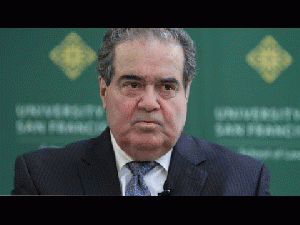On the day the death of Justice Antonin Scalia was announced, Georgetown Law School issued an official statement and press release headlined "Georgetown Law Mourns the Loss of U.S. Supreme Court Justice Antonin Scalia." It quoted the school's dean, William M. Treanor, heaping unqualified praise on the highly controversial justice.
"Scalia was a giant in the history of the law, a brilliant jurist whose opinions and scholarship profoundly transformed the law," Dean Treanor pronounced. "Like countless academics, I learned a great deal from his opinions and his scholarship. In the history of the Court, few justices have had such influence on the way in which the law is understood." Moreover, "he cared passionately about the profession, about the law and about the future. ... We will all miss him." It went on and on in that vein.
That's all well and good: If Dean Treanor revered Justice Scalia and his jurisprudence, there is no reason why he should refrain from expressing those sentiments. It's a bit odd for the official statement of a major law school to depict Scalia as though he were some sort of universally beloved figure, but there's nothing wrong with Dean Treanor personally advocating his viewpoint. That, after all, is one of the primary purposes of academic institutions: airing differing views and perspectives and vigorously debating them.
Two Georgetown law professors, Mike Seidman and Gary Peller, disagreed with Dean Treanor's glowing assessment of Scalia and said so. That night, Seidman posted a brief email to the dean and faculty noting: "Our norms of civility preclude criticizing public figures immediately after their death." As a result, said Seidman, "all I'll say is that I disagree with these sentiments and that expressions attributed to the 'Georgetown Community' in the press release issued this evening do not reflect the views of the entire community."
A full two days after Scalia's death, Professor Peller wrote an email -- first to the dean and the faculty, and thereafter to the entire law school -- explaining his dissent from the dean's praise. Like a huge number of Americans generally, and legal professionals particularly, Professor Peller viewed Scalia's role on the Supreme Court as toxic in the extreme, and he explained why.
Click Here to Read Whole Article
|
Rate It | View Ratings |

OpEdNews depends upon can't survive without your help.
If you value this article and the work of OpEdNews, please either Donate or Purchase a premium membership.
If you've enjoyed this, sign up for our daily or weekly newsletter to get lots of great progressive content.
Most Popular Articles by this Author: (View All Most Popular Articles by this Author)
HSBC, too big to jail, is the new poster child for US two-tiered justice system
US investigates possible WikiLeaks leaker for "communicating with the enemy"
Prosecution of Anonymous activists highlights war for Internet control
4 quick points about the MSNBC discussion
The myth of Obama's "blunders" and "weakness"
The Remarkable, Unfathomable Ignorance of Debbie Wasserman Schultz
To View Comments or Join the Conversation:





